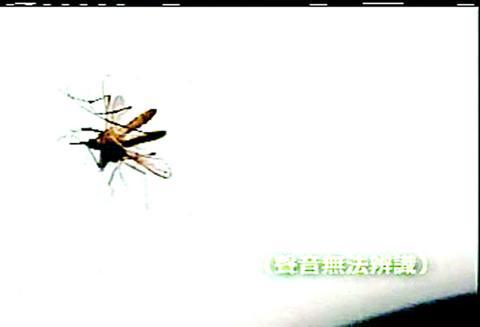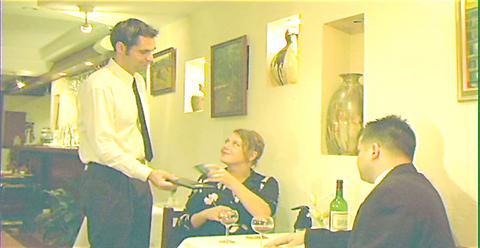For a testament to the presence of underground amateur film talent in Taipei, as well as to the concept that almost anyone can make movies now with a Guanghua-market PC and a cheap handycam, look no further than the Urban Nomad film festival, which starts today and runs through Sunday. The event screens a selection of short films by expat and local filmmakers that, while often extravagantly lo-fi in their production, are a refreshing break from the earnestness of Taipei's other film festivals.
This year, the organizers have tightened up their programming to cut down on the genuinely bad movies that have marred previous Urban Nomads and selected the choice cuts from among the movies submitted. They also solicited films from abroad and at colleges in Taiwan. So, this year's lineup of movies will try to balance the quirkiness of amateur alternative film with some near-professional level films to make the audience feel like their NT$200 wouldn't have been better spent on the latest Hollywood schlock flick.
A sneak preview of a handful of the scheduled movies shows plenty of promise. Tomorrow's digital shorts category will include former Taipei resident Jay Spieden's gory animation Choppy the Chimp and Les Arthur's Street Pong. In this second movie, two ping-pong players wheel their table through the streets of Taiwan to play in some random locations like in front of a Family Mart and eventually end up on a beach with the tide coming to add tension to their dramatic match point. It's not brilliant, but it's fun.

PHOTO COURTESY OF URBAN NOMAD
Norman Szabo's Dignity, which also screens tomorrow in the same category, enjoys some surprisingly good acting from local expats, as does TC Lin's spy thriller Clay Soldiers. Lin's film was submitted to the ladyxfilms.com film project that collects amateur spy flicks from around the world, and, in keeping with the genre's tradition, there are mysterious and ravishing ladies, a secret disc and a high-speed chase with bullets flying.
In tonight's program, two of the films previewed that are worth cheking out are The Locust, which is basically a music video for the LA band by the same name, and The Varieties of Romantic Experience, a short by Northwestern University film student Dan Freed shot with professional actors.
The highlight of the festival will be Sunday's screening of Aza Jakob's feature film Nobody Needs to Know, which has a synopsis on the film's own Web site that is entirely incomprehensible, but suggests a theme that explores the notion of the camera -- both the closed-circuit and the film kind -- as a tool of control. Part of the festival's program will be a free workshop tomorrow at Huashan Arts District by Ulead software company to tutor amateur filmmakers in its editing software.

PHOTO COURTESY OF URBAN NOMAD

PHOTO COURTESY OF URBAN NOMAD

Every now and then, it’s nice to just point somewhere on a map and head out with no plan. In Taiwan, where convenience reigns, food options are plentiful and people are generally friendly and helpful, this type of trip is that much easier to pull off. One day last November, a spur-of-the-moment day hike in the hills of Chiayi County turned into a surprisingly memorable experience that impressed on me once again how fortunate we all are to call this island home. The scenery I walked through that day — a mix of forest and farms reaching up into the clouds

With one week left until election day, the drama is high in the race for the Chinese Nationalist Party (KMT) chair. The race is still potentially wide open between the three frontrunners. The most accurate poll is done by Apollo Survey & Research Co (艾普羅民調公司), which was conducted a week and a half ago with two-thirds of the respondents party members, who are the only ones eligible to vote. For details on the candidates, check the Oct. 4 edition of this column, “A look at the KMT chair candidates” on page 12. The popular frontrunner was 56-year-old Cheng Li-wun (鄭麗文)

“How China Threatens to Force Taiwan Into a Total Blackout” screamed a Wall Street Journal (WSJ) headline last week, yet another of the endless clickbait examples of the energy threat via blockade that doesn’t exist. Since the headline is recycled, I will recycle the rebuttal: once industrial power demand collapses (there’s a blockade so trade is gone, remember?) “a handful of shops and factories could run for months on coal and renewables, as Ko Yun-ling (柯昀伶) and Chao Chia-wei (趙家緯) pointed out in a piece at Taiwan Insight earlier this year.” Sadly, the existence of these facts will not stop the

Oct. 13 to Oct. 19 When ordered to resign from her teaching position in June 1928 due to her husband’s anti-colonial activities, Lin Shih-hao (林氏好) refused to back down. The next day, she still showed up at Tainan Second Preschool, where she was warned that she would be fired if she didn’t comply. Lin continued to ignore the orders and was eventually let go without severance — even losing her pay for that month. Rather than despairing, she found a non-government job and even joined her husband Lu Ping-ting’s (盧丙丁) non-violent resistance and labor rights movements. When the government’s 1931 crackdown